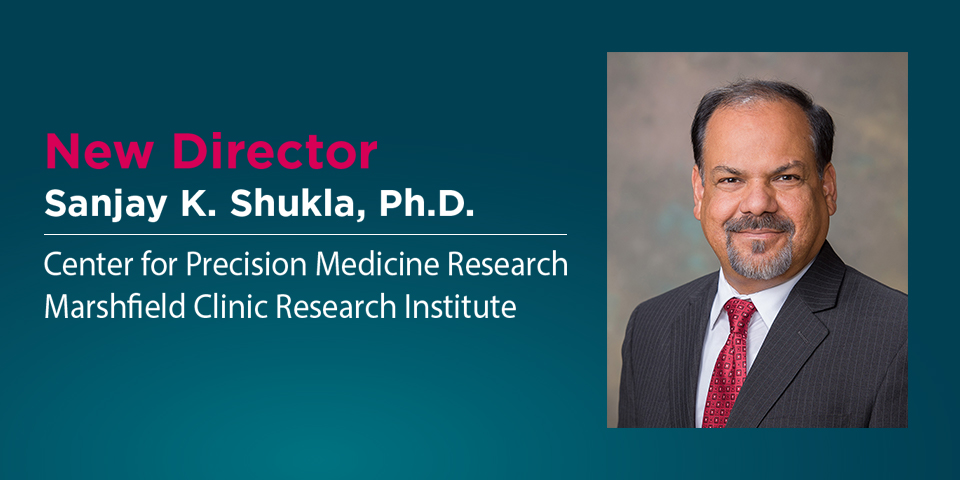Sanjay K. Shukla, Ph.D., is the new director of the Center for Precision Medicine Research at Marshfield Clinic Research Institute.
The Center for Precision Medicine Research combines research on the human genome with biomedical informatics and applies that knowledge to health care. Shukla will lead the scientific efforts and implement strategic initiatives for the further growth and expansion of the Center for Precision Medicine Research.
“It is an exciting time in the world of genetics research and biomedical informatics. We have learned many things over the last decade about the human genome and continue to understand more about the complexity of gene-environment interactions that affect our health. I know the Center for Precision Medicine Research is uniquely positioned to enhance and translate research into patient care," said Shukla. “I look forward to working with the researchers and staff here to take our research in genetics, precision medicine and biomedical informatics to new heights."
Shukla joined the Research Institute in 1998 and rose through the ranks to senior research scientist. The central theme of his research has been to gain insights into human-pathogen interactions that aided in biomarker discovery, and clinical treatment of infectious and complex diseases. He has authored more than 200 peer-reviewed manuscripts, book chapters and symposium abstracts. At the Research Institute, he developed a robust research program around a nosocomial scourge, MRSA – Methicillin-resistant Staphylococcus aureus. In a short time, he became nationally and internationally known for his work on genetics and pathophysiology of MRSA and staphylococcal diseases, particularly bacteremia.
His scientific expertise led him to serve on multiple National Institutes of Health (NIH) Study Sections and society journal editorial boards very early in his career. Over the last ten years, he has also established a robust program in microbiome research. For example, he is investigating how the dysbiosis of gut and oral microbiome could play a role in devastating diseases such as multiple sclerosis, type 2 diabetes and myalgic encephalomyelitis, in addition to health risks and benefits of exposure to environmental microbiome in dairy farm workers.
Shukla has been frequently invited to speak on his research on microbiome and staphylococci at numerous international conferences including NIH-sponsored research direction meetings, and the prestigious Cold Spring Harbor meetings and Gordon Research Conference. His research has been funded by NIH, National Institute of Occupational Safety and Health, Centers for Disease Control and Prevention, Institute for Clinical and Translational Research, Wisconsin Network for Health Research, and private, non-for-profit research foundations. Over the years, he has mentored a large number of summer interns, graduate students, postdoctoral fellows and medical residents.
Previously, he was the founding co-director of the Research Institute Core laboratory (now Integrated Research and Development Laboratory) and served in that capacity for five years developing the infrastructure for implementing physician-led research projects. He has both served on and chaired numerous committees for many years including, but not limited to, Research Committee, Animal Care Committees and Institutional Review Board. He was in charge of organizing the Research Institute's Scientific Seminar Series and ID Journal Clubs for over a decade.
“Dr. Shukla has been an integral part of our Research Institute for more than 20 years. In that time, he has also led important research that has received national acclaim. I look forward to the expertise and leadership he brings to this role that will continue to push the boundaries of research in precision medicine," said Amit Acharya, Ph.D., B.D.S., executive director of the Research Institute. “I would also like to take this opportunity to thank Dr. Murray Brilliant for his vision around the growth of precision medicine at the Health System. I very much appreciated his invaluable support and leadership over the last decade at our Research Institute where he served as the center director of Center for Human Genetics and more recently interim center director of Center for Precision Medicine Research."

